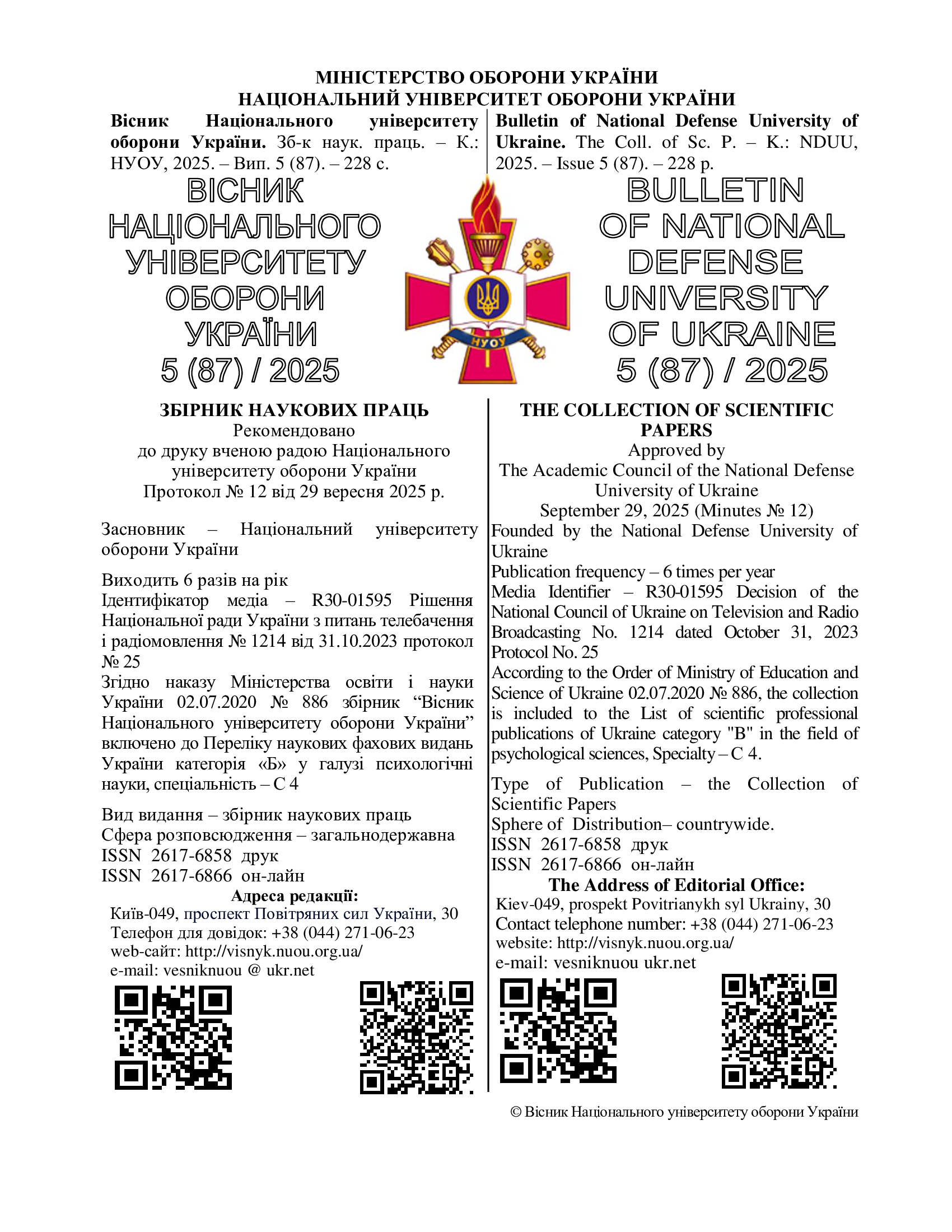УСВІДОМЛЕНА САМОРЕГУЛЯЦІЯ ТА НАВЧАЛЬНА ЗАЛУЧЕНІСТЬ ЯК РЕСУРСИ СУБ'ЄКТИВНОГО БЛАГОПОЛУЧЧЯ ЗДОБУВАЧІВ
DOI:
https://doi.org/10.33099/2617-6858-2025-87-5-131-138Ключові слова:
усвідомлена саморегуляція, суб'єктивне благополуччя, навчальна залученість, ресурсний підхід, психологічні ресурси.Анотація
Представлено результати емпіричного дослідження у межах актуальної проблеми пошуку психологічних ресурсів суб'єктивного благополуччя. Теоретичним підґрунтям є ресурсний підхід до вивчення усвідомленої саморегуляції досягнення цілей. Встановлено, що рівень розвитку усвідомленої саморегуляції та рівень навчальної залученості роблять значущий внесок у підтримання суб'єктивного благополуччя здобувачів в освітньому середовищі ЗВО. Отримано нові дані про те, що загальний рівень розвитку усвідомленої саморегуляції та окремі регуляторні компетенції (планування, моделювання, програмування, оцінювання результатів) є медіаторами впливу залученості на суб'єктивне благополуччя здобувачів. Розширюючи розуміння детермінант суб'єктивного благополуччя здобувачів, отримані результати надають нові арґументи на користь раніше розвиненого уявлення про те, що усвідомлена самореґуляція як метаресурс не лише робить внесок в успішність розв'язання різноманітних життєвих проблем, а й посилює вплив на неї інших психологічних ресурсів. Результати дослідження обґрунтовують продуктивність психолого-педагогічних інтервенцій, спрямованих на розвиток усвідомленої саморегуляції та підтримання навчальної залученості як значущих ресурсів суб'єктивної задоволеності освітнім середовищем юнацького віку.
Завантаження
Посилання
Archambault I., Janosz M., Goulet M., Dupéré V., Gilbert-Blanchard O. (2019). Promoting student engagement from childhood to adolescence as a way to improve positive youth development and school completion. Handbook of student engagement interventions. Academic Press, 13–29.
Buzzai C., Sorrenti L., Costa S., Toffle M., Filippello P. (2021). The relationship between school-basic psychological need satisfaction and frustration, academic engagement and academic achievement. School Psychology International, 42, 5, 497–519. DOI:10.1177/01430343211017170
Datu J.A.D., King R.B. (2018). Subjective well-being is reciprocally associated with academic engagement: A two-wave longitudinal study. Journal of school psychology, 69, 100–110. DOI:10.1016/j.jsp.2018.05.007
Demirci I. (2020). School engagement and well-being in adolescents: Mediating roles of hope and social competence. Child Indicators Research, 13, 5, 1573–1595. DOI:10.1007/s12187-020-09722-y
Estévez I., Rodríguez-Llorente C., Piñeiro I., González-Suárez R., Valle A. (2021). School engagement, academic achievement, and self-regulated learning. Sustainability, 13, 6, 3011. DOI:10.3390/su13063011
Fredricks J.A., Parr A.K., Amemiya J.L., Wang M.-T., Brauer S. (2019). What matters for urban adolescents’ engagement and disengagement in school: a mixed-methods study. Journal of Adolescent Research, 34, 5, 491–527. DOI:10.1177/0743558419830638
Fredrickson B.L. (2013). Positive emotions broaden and build. Advances in experimental social psychology. Academic Press. 2013, 47, 1–53. DOI:10.1016/B978-0-12-407236-7.00001-2
Hayes A.F. (2022). Introduction to mediation, moderation, and conditional process analysis: A regression-based perspective (3-rd ed.). New York, NY: The Guilford Press. 494 p.
Heffner A.L., Antaramian S.P. (2016). The Role of Life Satisfaction in Predicting Student Engagement and Achievement. Journal of Happiness Studies, 17, 4, 1681–1701. DOI:10.1007/s10902-015-9665-1
Liu X., Flick R. (2019). The relationship among psychological need satisfaction, class engagement, and academic performance: Evidence from China. Journal of Education for Business, 94, 6, 408–417. DOI:10.1080/08832323.2018.1541855
Molinari L., Mameli C. (2018). Basic psychological needs and school engagement: A focus on justice and agency. Social Psychology of Education, 21, 157–172. DOI:10.1007/s11218-017-9410-1
Preacher K.J., Hayes A.F. (2004). SPSS and SAS procedures for estimating indirect effects in simple mediation models. Behavior research methods, instruments, & computers, 36, 717–731. DOI:10.3758/BF03206553
Reschly A.L., Huebner E.S., Appleton J.J., Antaramian S. (2008). Engagement as flourishing: The contribution of positive emotions and coping to adolescents' engagement at school and with learning. Psychology in the Schools, 45, 5, 419–431. DOI:10.1002/pits.20306
Rodríguez S., González-Suárez R., Vieites T., Piñeiro I., Díaz-Freire F.M. (2022). Self-regulation and student well-being: A systematic review 2010–2020. Sustainability, 14, 4, 2346. DOI:10.3390/su14042346
Salmela‐Aro K., Tang X., Symonds J., Upadyaya K. (2021). Student engagement in adolescence: a scoping review of longitudinal studies 2010–2020. Journal of Research on Adolescence, 31, 2, 256–272. DOI:10.1111/jora.12619
Stan M.M., Topală I.R., Necşoi D.V., Cazan A.-M. (2022). Predictors of learning engagement in the context of online learning during the COVID-19 pandemic. Frontiers in psychology, 13, 867122. DOI:10.3389/fpsyg.2022.867122
Tao Y., Meng Y., Gao Z., Yang X. (2022). Perceived teacher support, student engagement, and academic achievement: A meta-analysis. Educational Psychology, 42, 4, 401–420. DOI:10.1080/01443410.2022.2033168
van Genugten L., Dusseldorp E., Massey E.K., van Empelen. (2017). Effective self-regulation change techniques to promote mental wellbeing among adolescents: a meta-analysis. Health psychology review, 11, 1, 53–71. DOI:10.1080/17437199.2016.1252934
Wang M.-T., Hofkens T.L. (2020). Beyond classroom academics: A school-wide and multi-contextual perspective on student engagement in school. Adolescent Research Review, 5, 419–433. DOI:10.1007/s40894-019-00115-z
Wang Y., Tian L., Huebner E. (2019). Basic psychological needs satisfaction at school, behavioral school engagement, and academic achievement: Longitudinal reciprocal relations among elementary school students. Contemporary Educational Psychology, 56, 130–139. DOI:10.1016/J.CEDPSYCH.2019.01.003
Wong Z.Y., Liem G.A.D., Chan M., Datu J.A.D. (2023). Student engagement and its association with academic achievement and subjective well-being: A systematic review and meta-analysis. Journal of Educational Psychology, 116, 1, 48–75. DOI:10.1037/edu0000833
##submission.downloads##
Опубліковано
Як цитувати
Номер
Розділ
Ліцензія
Авторське право (c) 2025 Вісник Національного університету оборони України

Ця робота ліцензується відповідно до Creative Commons Attribution-NonCommercial-ShareAlike 4.0 International License.





